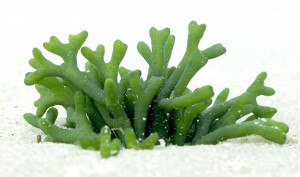 Algae: They have been around for 3 billion years, and there may be hundreds of thousands of species, many as yet undiscovered. By creating oxygen from CO2, they made animal life possible, and still provide 60% of the earth’s oxygen. Low on the food chain, they nourish trillions of beings, and yet they are far from simple. They are the most powerful organisms on our planet, they are found everywhere, and we have really only just begun to study them and to understand their vast potential.
Algae: They have been around for 3 billion years, and there may be hundreds of thousands of species, many as yet undiscovered. By creating oxygen from CO2, they made animal life possible, and still provide 60% of the earth’s oxygen. Low on the food chain, they nourish trillions of beings, and yet they are far from simple. They are the most powerful organisms on our planet, they are found everywhere, and we have really only just begun to study them and to understand their vast potential.
Algae are used in ways that cannot be counted:
- as food (dulse in Ireland, laver in Wales, gim in Korea, nori in Japan), high in omega 3s, DHA and EHA, and B12; even the omega 3s in fish oils probably come from the algae eaten by the fish. Algae has a biomass of 50% proteins.
- as pigment, a less harmful alternative to chemical dyes.
- for stabilizing, stabilizing, emulsifying in a vast range of things including toothpastes, shaving cream, lotions, paints, pet foods, milk products, dental molds, medicines;
- for agar, used in food, medicine, and stabilizing and growing cultures for mycology and bacteriology.
- for biodegradable plastics.
- for fertilizers, soil conditioners, and feed for livestock. Seaweed has been used in fields for thousands of years, but in addition, algae can assimilate nitrogen and other elements from agricultural wastes.
- for filters and as rubbing media.
- for purifying water and removing toxins in industrial waste and sewage, thus recycling water and increasing our supplies of potable water.
- for biofuel, because it has a biomass of 60% lipids, and grows at least 30 times faster than other organisms (such as corn) used for biofuels. It requires no arable land to make biofuel, grows anywhere, needs only sunshine and waste water, and even converts CO2 into oxygen. What is left over may be used for fertilizers, feed, and other fuels. Investment in algal biofuels will also eventually free us from expensive dependency on foreign oil, but in the short term will reduce costs by complementing this dependency.
To harness the immense power of algae, we first have to recognize that these are complex little beings with complex social lives and complex life cycles, all of which we have just begun to study both in the lab and in the field. This is not a task to be mastered in a couple of years by fast, showy start-up companies; it involves patient research and development over many years and within an intricate web of scientific and industrial partnerships. Embodying a business ethic of humble hard work, careful investigation, solid evidence, and reliable productivity, Eldorado Biofuels is the pioneer in algae cultivation and the low-cost production of algal biomass for every use.
